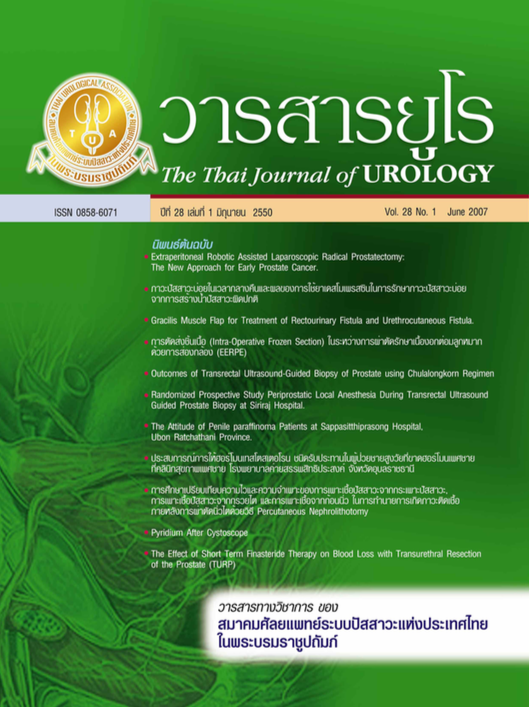Nocturia and Efficacy of Desmopressin for Treatment of Polyuric Nocturia
Keywords:
Nocturia, Desmopressin, Polyuric NocturiaAbstract
Objective: To investigate incidence of polyuric nocturia in nocturia patient and efiicacy, the effect on quality of life, safety of Desmopressin in treatment of polyuric nocturia.
Patients and Methods: Total 34 patients who were verified nocturia which 15 patients were diag- nosed polyuric nocturia were recruited .Average age was 67.87 year (range 60-80 years) Desmopressin (0.1 mg) was given to the patients who was diagnosed polyuric nocturia for 4 weeks. After 2, 4 weeks these people were collected symptom by frequency/volume chart and quality of life by Kingûs Health Questionnaire, General Health questionnaire and blood for electrolyte.
Results: Fifteen patients of 34 patients were diagnosed polyuric nocturia (44%). On the average, frequency of nocturnal void decreased from 2.73+0.34 to 1.6+0.64 at 2 wks and 1.68+0.43 at 4 wks (p=0.002) and nocturnal void volume decreased from 437.39+157. 14 ml to 255.74+136. 18 ml at 2 wks and 251.87+127. 97 ml at 4 wks (p=0.001). The scores of KHQ questionnaire and General Health questionnaire were improved after 4 weeks of Desmopressin. Most adverse events were mild. Serum sodium were >130 mmol/l in 14 patients but one <130 mmol/L at 2 wk follow up. No significant symptom of hyponatremia was shown.
Conclusion: Polyuric nocturia is major cause of nocturia. Oral Desmopressin is effective and well tolerated in treatment of polyuric nocturia patients.
References
Van Kerrbroek P, Abrams P,Chaikin D, et al. The standardization of terminology in Nocturia : report from the standardization sub- committee of the International Continence Society. Neurouol Urodyn 2002; 21: 179-83.
Asplund R, Aberg H. Diurnal variation in the levels of antidiuretic hormone in the elderly. J Intern Med 1991; 229(2): 131-4.
Asplund R. Nocturia, nocturnal polyuria, and sleep quality in elderly. J Psychosom Res 2004; 56(5): 517-25.
Moon DG, Jin MH, Lee JG, Kim JJ, Kim MG, Cha DR. Antidiuretic hormone in elderly male patients with severe nocturia: a circadian study. BJU Int 2004; 94(4): 571-5.
Asplund R, Aberg H. Diurnal rhythm of antidiuretic hormone inelderly subjects with nocturia. Med Sci Res 1991; 19: 765-6.
Asplund R. Nocturia, nocturnal polyuria, and sleep quality in elderly. J Psychosomatic Research 2004; 56(5): 517-25.
Asplund R. Micturition habits and diuresis in relation to sleep and well-being in elderly subjects with emphasis on antidiuretic hormone (Dissertation). Karolinska Institute, Stockholm; 1995.
Bulpitt CJ, Fletcher AE, Thijs L, et al. Symptoms reported by Elderly patients with isolated systolic hypertension. Age Ageing 1999; 28(1): 15-22.
Weiss JP, Blaivas JG. Nocturia. Curr Urol Rep 2003; 4(5): 362-6.
Swithinbank LV, Vestey S, Abrams P. Nocturnal polyuria in community-dwelling women. BJU Int 2004; 93: 1-6.
Asplund R. Nocturia and nocturnal polyuria in the elderly. Treatment essential for increasing patientsû quality of life and decreasing the risk of injury. Lakartidningen 2002; 99(44): 4370-3.
Ho DR, Lin WY, Wu CF, Shee JJ, Huang YC, Chen CS. Clinical observations of effect of antidiuretic hormone on nocturia in elderly men. BJU Int 2005; 96(9): 1310-3.
Ali A, Snape J. Nocturia in older people: a review of causes, consequences, assessment and management. Int J Clin Pract 2004; 58(4): 366-73.
Lose G, Alling-Møller L, Jennum P. Nocturia in women. Am J Obstet Gynecol 2001; 185(2): 514-21.
Miller M. Nocturnal polyuria in older people: Pathophysiology and clinical implications. J Am Geriatr Soc 2000; 48(10): 1321-9.
Mattiason A, Abrams P, Van Kerrbroek P, Walter S, Weiss J. Efficacy of Desmopressim in treatment of nocturia a double-bind placebo-controlled study in men. BJU Int 2002; 89(9): 855-62.
Rembratt A, Norgaard JP, Anderson KE. Desmopressin in elderly patients with nocturia : Short-term safety and effects on urine output, sleep and voiding patterns. BJU Int 2003; 91(7): 642-6.
Rembratt A, Graugaard-Jensen C, Senderovitz T, Norgaard JP, Djurhuus JC. Pharmacokinetics and pharmacodynamics of Desmopressin administered orally versus intravenously at daytime versus night time in healthy men aged 55-70 years. Eur J Clin Pharmacol 2004; 60(6): 397-402.
Kobelt G, Brogstrom F, Mattiasson A. Productivity, vitality and utility in a group of health professionally active individuals with Nocturia. BJU Int 2003; 91(3): 190-5.



